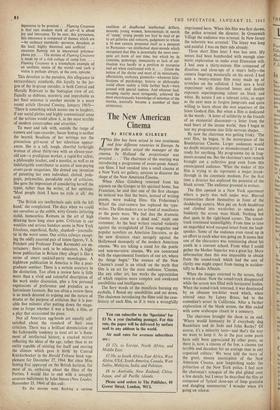The New American Cinema
By RICHARD GILBERT his film has been seized in two continents
and four different countries in Europe. In Belgium the police seized the manager of the cinema. In Holland the projectionist was arrested. . . .' The chairman of the meeting was introducing a programme of avant-garde Ameri- can films. I had sneaked into a small cinema at a New York art gallery, anxious to discover the shape of the New American Cinema.
When Allen Ginsberg returned from his sojourn on the Ganges to his spiritual home, San Francisco, he said that one of the first changes he noticed was that the beats, instead of writing poems, were making films. On Fisherman's Wharf the cine-camera has replaced the type- writer. The film-makers are as fond of manifestos as the poets were. 'We feel that the dramatic cinema has come to a dead end,' reads one statement. As the beat writers reacted violently against the stranglehold of Time magazine and popular novelists on American literature, so do the new directors react savagely against the Hollywood monopoly of the modern American cinema. 'We are taking a stand for the poetic and non-narrative cinema. We are concerned with the experimental frontiers of our art, where the things begin.' The essence of the New Cinema's creed is an attack on the myth that film is an art for the mass audience. 'Cinema, like any other art, has works the appreciation of which requires more complex and awakened sensibilities and intelligences.'
The fiery words of the manifesto burning my eyeballs, I flexed my sensibilities and sat down. The chairman introducing the films told the case- history of each film, as if it were a wrongfully
SPECTATOR, JANUARY 22, I 9 6 5 imprisoned hero. 'When this film was first shown, the police arrested the director. In Greenwich Village the audience was arrested. in New Jersey the usherette was arrested.' The litany was long and painful. I was on their side already. Three short films later I was less sure. My
senses had been bombarded with enough cine- matic exploration to make even Eisenstein wilt.
I had seen a thirty-minute film composed of
dissolves and close-ups of a man's belly—the
camera lingering maniacally on his naval. I had In seen a twenty-minute film essay made up of scratches on the celluloid. I had seen a brief Gon experiment with distorted lenses and double exposure superimposing colour on black and have white. By nature 1 am a tolerant critic, as cage: as the next man to forgive jump-cuts and quite govc willing to learn about the non sequiturs of the arelatest Godard film. But when a film is dedicated in the words : 'A letter of solidarity to the friends gs"c of an existential discontent—a letter from the mad heart of the insane world,' then I begin to tear my programme into little nervous shapes. next film,' he began, 'is the masterpiece of the no doubt misinterpret or misunderstand it.' I was Baudelairian Cinema. Larger audiences would
By now the chairman was getting frisky. 'The ments around me. But the chairman's next remark
brought out a collective gasp even from this his
emancipated audience. 'What the maker of this ready for anything. My programme lay in frag.
film is trying to do represents a major: break- through in the cinematic medium. For the first time a director has explored the potential of the 196 blank screen.' The audience groaned in ecstasy. shuddering camera. Men put on Arab headdress where a party was well under way. Blurred transvestites threw themselves in front of the and climbed into wardrobes to smoke pot. Suddenly the screen went blank. Nothing but The film opened in a New York apartment dust spots in the right-hand corner. The sound• track continued unintelligibly. From time to time des an ungarbled word escaped intact from the loud wit
speaker. Some of the audience even stood up in Per
an effort to catch what was going on. It seems that one of the characters was reminiscing about his youth in a convent school. From what 1 could is gather the Mother Superior was a great lay. More information than this was impossible to obtain in from the sound-track which had the sort of tit( clarity one might expect from tuning in acciden an tally. to Radio Albania. is
When the images returned to the screen, they yu were in colour. Now the sound-track disappeared re
while the screen was filled with horizontal bodies. th When the sound-track returned, it was dominated or by an obscene ten-letter word which, when in uttered once by Lenny Bruce, led to the comedian's arrest in California. After a further exploration of the blank screen, the film ended with some arabesque rituals in a cemetery.
The chairman brought the show to an end. 'Where would humanity be if everybody dug Baudelaire and de Sade and John Rechy? Of course, it's a minority taste—and that's the way we want to keep it. As in the past some poets have only been appreciated by other poets, so there is, now, a cinema of the few, a cinema too terrible and decadent for an average man in any organised culture.' We were told the story of the great, unseen masterpiece of the New American Cinema, now languishing under the protection of the New York police. I feel sure the chairman's synopsis of the plot glided over a few details, but I swear he described the film as composed of 'lyrical close-ups of limp genitalia and dangling mammaries.' I wonder when it's going on release.






































 Previous page
Previous page